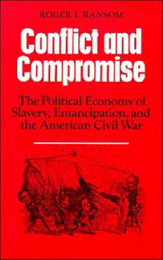
|
Conflict and Compromise: The Political Economy of Slavery, Emancipation and the American Civil War
Paperback / softback
Main Details
| Title |
Conflict and Compromise: The Political Economy of Slavery, Emancipation and the American Civil War
|
| Authors and Contributors |
By (author) Roger L. Ransom
|
| Physical Properties |
| Format:Paperback / softback | | Pages:336 | | Dimensions(mm): Height 228,Width 152 |
|
| Category/Genre | World history - c 1750 to c 1900
American civil war |
|---|
| ISBN/Barcode |
9780521311670
|
| Classifications | Dewey:973.71 |
|---|
| Audience | | Tertiary Education (US: College) | | Professional & Vocational | |
|---|
| Illustrations |
Worked examples or Exercises
|
|
Publishing Details |
| Publisher |
Cambridge University Press
|
| Imprint |
Cambridge University Press
|
| Publication Date |
29 September 1989 |
| Publication Country |
United Kingdom
|
Description
No series of events has had a more dramatic impact on the course of American history than the Civil War and the emancipation of four million black slaves. In this book Professor Roger Ransom examines the economic and political factors that led to the attempt by Southerners to dissolve the Union in 1860, and the equally determined effort of Northerners to preserve it. Drawing on recent research in economic, political, and social history, Ransom argues that the system of capitalist slavery in the South not only 'caused' the Civil War by producing tensions that could not be resolved by compromise; it also played a crucial role in the outcome of that War by crippling the southern war effort at the same time that emancipation became a unifying issue for the North.
Reviews'Skillfully drawing on recent scholarship as well as the author's own important research, Roger Ransom's Conflict and Compromise presents a solid interpreta-tion of the interplay of political, economic, and social developments in the Civil War era. Ransom deftly handles many controversial questions; his discus- sions of the institution of slavery and southern society, the impact of the war on industrialization, the consequences of emancipation, and causes of the postwar South's economic retardation are gems of historical analysis. An excellent intro-duction to the period.' William E. Gienapp, Harvard University
|